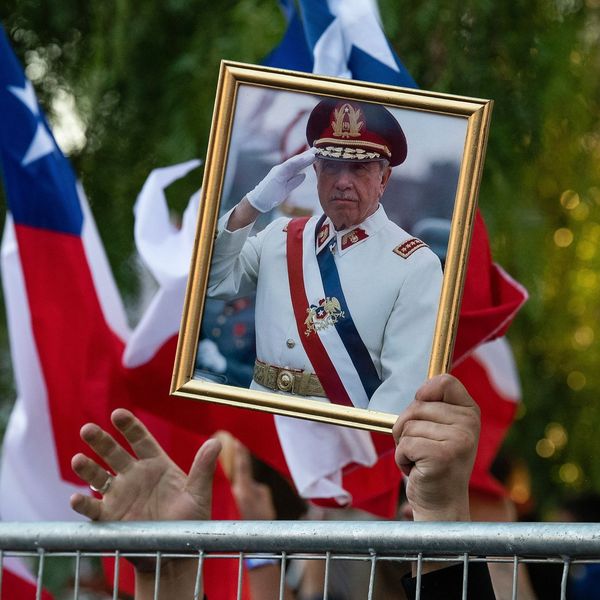Chile Admits Pablo Neruda May Have Been Killed by Pinochet Regime
"Highly probable" prize-winning poet and leftist politician was targeted, interior document states
The Chilean government on Thursday recognized for the first time that Nobel-prize winning poet and leftist diplomat Pablo Neruda may have been murdered by the regime of Augusto Pinochet, following the U.S.-backed coup that led to Pinochet's rise to power in 1973.
Chile's Interior Ministry made the statement in response to a ministry document published in May and obtained by the Spanish newspaper El Pais.
"It's clearly possible and highly probable that a third party" was responsible for Neruda's death, the document said, adding that he was either injected with or orally administered a foreign substance hours before his death.
Neruda officially died of natural causes on September 23, 1973, at the Santa Maria clinic in Santiago, where he had previously been treated for cancer. But suspicions that Pinochet had a hand in his death lingered for decades. The controversy prompted Chilean investigators to exhume his body in 2013 for examination.
One of Neruda's nephews, Rodolfo Reyes, last month told a press conference that he believed his uncle had been poisoned.
Neruda was a close friend of former Chilean President Salvador Allende, who killed himself on September 11, 1973 as Pinochet seized power. Allende's death and the new regime's brutal rule prompted Neruda to make plans to go into exile and speak out against Pinochet's dictatorship--but a day before he was set to depart, he was taken by ambulance to the Santa Maria clinic in Santiago, where he had previously been treated for cancer. He died there on September 23, 1973.
An initial round of forensic testing did not turn up signs Neruda was poisoned, but the judge investigating the case ordered a second test to look for substances that were not previously included in the examination.
An Urgent Message From Our Co-Founder
Dear Common Dreams reader, The U.S. is on a fast track to authoritarianism like nothing I've ever seen. Meanwhile, corporate news outlets are utterly capitulating to Trump, twisting their coverage to avoid drawing his ire while lining up to stuff cash in his pockets. That's why I believe that Common Dreams is doing the best and most consequential reporting that we've ever done. Our small but mighty team is a progressive reporting powerhouse, covering the news every day that the corporate media never will. Our mission has always been simple: To inform. To inspire. And to ignite change for the common good. Now here's the key piece that I want all our readers to understand: None of this would be possible without your financial support. That's not just some fundraising cliche. It's the absolute and literal truth. We don't accept corporate advertising and never will. We don't have a paywall because we don't think people should be blocked from critical news based on their ability to pay. Everything we do is funded by the donations of readers like you. Will you donate now to help power the nonprofit, independent reporting of Common Dreams? Thank you for being a vital member of our community. Together, we can keep independent journalism alive when it’s needed most. - Craig Brown, Co-founder |
The Chilean government on Thursday recognized for the first time that Nobel-prize winning poet and leftist diplomat Pablo Neruda may have been murdered by the regime of Augusto Pinochet, following the U.S.-backed coup that led to Pinochet's rise to power in 1973.
Chile's Interior Ministry made the statement in response to a ministry document published in May and obtained by the Spanish newspaper El Pais.
"It's clearly possible and highly probable that a third party" was responsible for Neruda's death, the document said, adding that he was either injected with or orally administered a foreign substance hours before his death.
Neruda officially died of natural causes on September 23, 1973, at the Santa Maria clinic in Santiago, where he had previously been treated for cancer. But suspicions that Pinochet had a hand in his death lingered for decades. The controversy prompted Chilean investigators to exhume his body in 2013 for examination.
One of Neruda's nephews, Rodolfo Reyes, last month told a press conference that he believed his uncle had been poisoned.
Neruda was a close friend of former Chilean President Salvador Allende, who killed himself on September 11, 1973 as Pinochet seized power. Allende's death and the new regime's brutal rule prompted Neruda to make plans to go into exile and speak out against Pinochet's dictatorship--but a day before he was set to depart, he was taken by ambulance to the Santa Maria clinic in Santiago, where he had previously been treated for cancer. He died there on September 23, 1973.
An initial round of forensic testing did not turn up signs Neruda was poisoned, but the judge investigating the case ordered a second test to look for substances that were not previously included in the examination.
The Chilean government on Thursday recognized for the first time that Nobel-prize winning poet and leftist diplomat Pablo Neruda may have been murdered by the regime of Augusto Pinochet, following the U.S.-backed coup that led to Pinochet's rise to power in 1973.
Chile's Interior Ministry made the statement in response to a ministry document published in May and obtained by the Spanish newspaper El Pais.
"It's clearly possible and highly probable that a third party" was responsible for Neruda's death, the document said, adding that he was either injected with or orally administered a foreign substance hours before his death.
Neruda officially died of natural causes on September 23, 1973, at the Santa Maria clinic in Santiago, where he had previously been treated for cancer. But suspicions that Pinochet had a hand in his death lingered for decades. The controversy prompted Chilean investigators to exhume his body in 2013 for examination.
One of Neruda's nephews, Rodolfo Reyes, last month told a press conference that he believed his uncle had been poisoned.
Neruda was a close friend of former Chilean President Salvador Allende, who killed himself on September 11, 1973 as Pinochet seized power. Allende's death and the new regime's brutal rule prompted Neruda to make plans to go into exile and speak out against Pinochet's dictatorship--but a day before he was set to depart, he was taken by ambulance to the Santa Maria clinic in Santiago, where he had previously been treated for cancer. He died there on September 23, 1973.
An initial round of forensic testing did not turn up signs Neruda was poisoned, but the judge investigating the case ordered a second test to look for substances that were not previously included in the examination.

